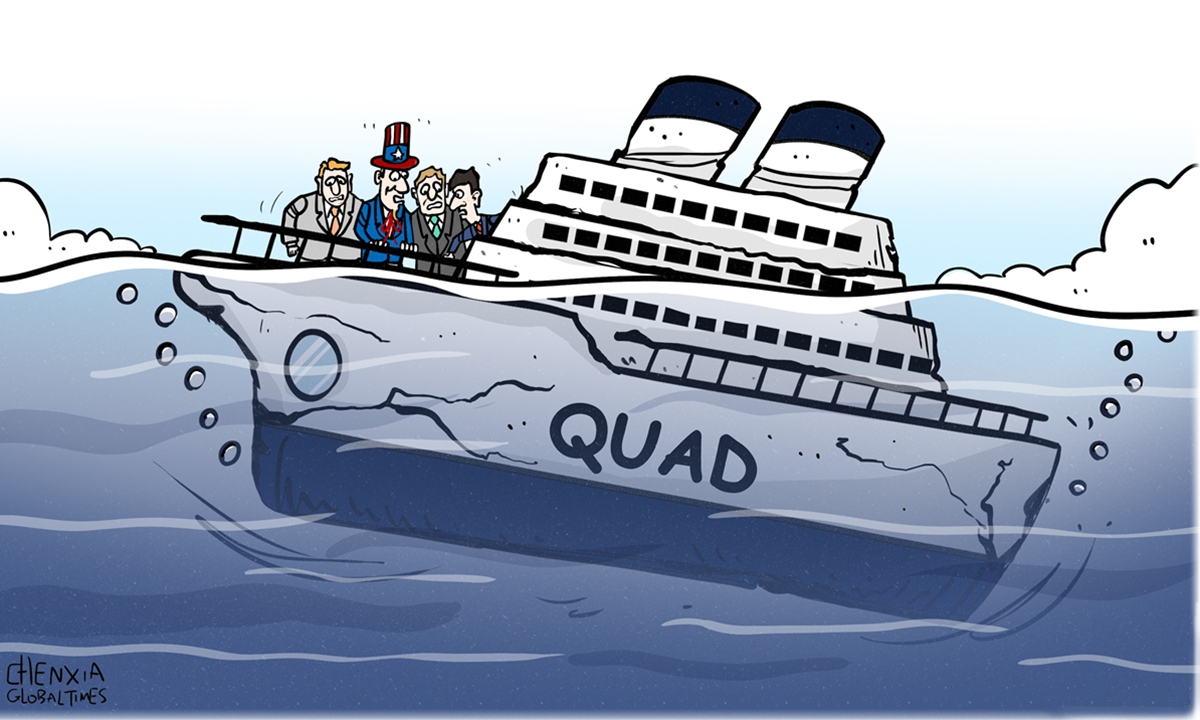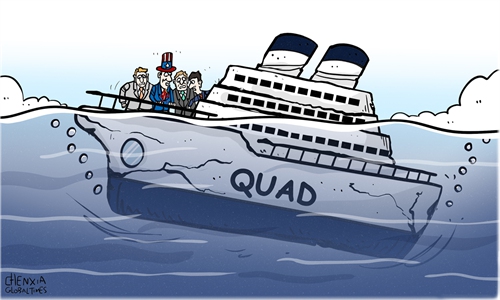
Illustration: Chen Xia/GT
As the world has entered a new year, the Quad is facing new uncertainties as well. There has been much discussion in the strategic community regarding the future of this quadrilateral mechanism, as some believe the US has shown a tendency to lack strength in promoting it. The recent instances of the US leader snubbing the Quad summit for domestic issues seem to confirm that this "loose partnership" has increasingly become a lower priority in Washington's diplomatic agenda.
Australian media outlet Sydney Morning Herald reported on Tuesday that preparations were underway for Indian Prime Minister Narendra Modi to host the Quad summit on January 27, one day after India's Republic Day, but these plans were abandoned after US President Joe Biden declined an invitation to travel to India, leaving the date of the next quadrilateral summit still in the air.
The previous Quad summit scheduled to be held in Sydney in May last year was canceled at the last minute because Biden called off his visit to Australia to deal with the US debt ceiling crisis. Biden's recent refusal to visit India is making people wonder: Is it possible that the Quad summit will be thwarted for the second consecutive year?
Admittedly, this year's Quad summit faces many challenges. For example, three out of the four Quad members will hold important elections, with the US and India facing general elections, and Japan's ruling Liberal Democratic Party set to hold a leadership election in September. As the election prospects for the current US and Japanese leaders remain unclear, so does this year's Quad summit, experts told the Global Times.
In addition to US' lukewarm attitude, India, known as the weakest link in the Quad according to many strategists, will also cast some uncertainty surrounding Quad's cooperation. Specifically, it is unclear how New Delhi's relationship with Washington will develop this year, following their recent disagreement over alleged Sikh assassination plots in the US.
Suffice it to say, the US is frustrated with India in many ways. On several global issues, including the Russia-Ukraine conflict, India's stance is inconsistent with, or even contradictory to, that of the US. In fact, New Delhi has its own agenda, using Washington to further its own interests without reciprocating. Apart from that, Australia, another Quad member, is also expected to show some dissonance with the US' Indo-Pacific Strategy aiming at Beijing as China-Australia relations improve.
Indeed, the Quad countries have their own interests to pursue in this quadrilateral relationship. Yes, there are some common grounds in certain areas: It is well known that the Quad exists to guard against China based on surreal speculations on the country's "threat." Yet, the establishment of any relations driven by strategic hysteria and delusions will naturally never go far. In this case, with growing differences in the Quad members' interests, this relationship may have reached its peak and is unlikely to effectively function as the pillar of Washington's Indo-Pacific Strategy as the US envisions.
On the other hand, a potentially bigger threat to the Quad comes from Washington, the mechanism's sole and absolute leader. Lü Xiang, a research fellow at the Chinese Academy of Social Sciences told the Global Times that Donald Trump, who is still a strong contender for the next US president, has already vowed to kill off the Indo-Pacific Economic Framework if elected. If that will be the fate of an officially signed agreement, who knows what lies before a loose partnership like Quad?
In the Asia-Pacific region, the US already has several alliances and partnerships that it considers useful, including the Five Eyes, AUKUS, and the US-Japan-South Korea trilateral partnership. The attitude of the US toward these small circles is utilitarianism and Washington always upholds "America First" doctrine. The level of attention given by the US is directly proportional to which small circle can best serve its own interests and whether Washington can exert control over it. It seems that the Quad is continuing to drop on the US' priority list due to a lack of strong cohesion and its function solely as an effective talking shop.
"The Quad will still be mentioned by the four countries, but we may never see real efforts in building up the quadrilateral relationship and establishing substantial binding," said Lü.

